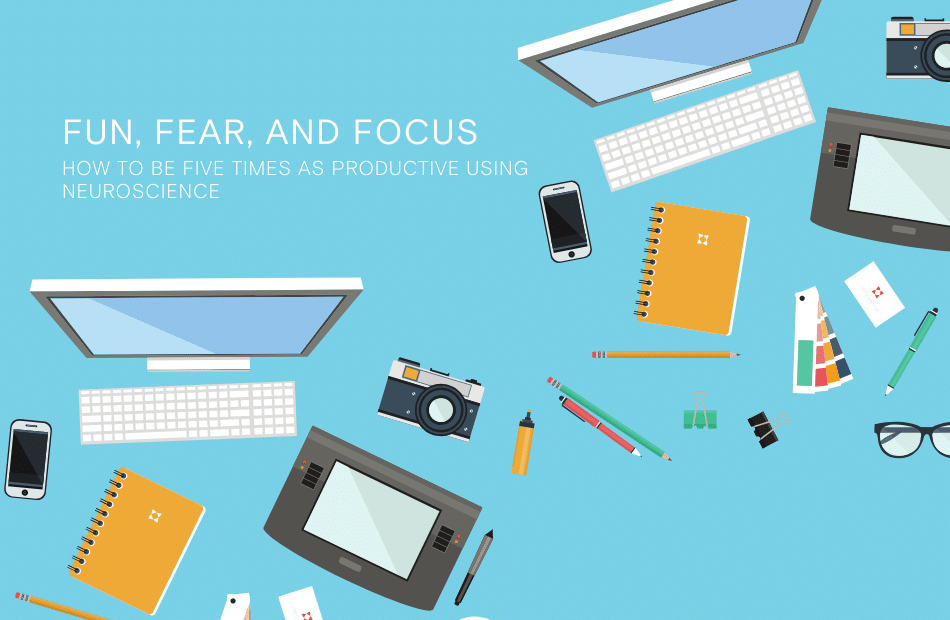Fun, Fear, and Focus
Most of us recognize that heady feeling when we’re performing at our very best. Time becomes irrelevant, doubt and self-consciousness evaporate, and you find yourself completely immersed in the task at hand. It’s almost like falling in love with whatever you’re doing. For a short time, it becomes the center of your universe.
According to McKinsey, when you reach this exalted state, commonly known as “flow”, you are a whopping five times more productive. Wouldn’t it be great to gain a fast track to flow? Thanks to brain science, you can. We now know that three distinct neurochemicals produce this unmistakable feeling: dopamine, noradrenaline, and acetylcholine. But if that chemical soup sounds a little intimidating, there’s an even easier way to remember the recipe. When you want to move into that pleasant but powerful zone of productivity wherever and whenever you need it, all it takes are fun, fear and focus.

Fun
When we experience pleasure, our brain releases dopamine. In fact, dopamine is sometimes known as “the Kim Kardashian of neurochemicals” because it is associated with excitement, sensation seeking, and addiction, but above all, with fun. Of course, when I refer to “fun” at your job, I’m not talking about after-work-party fun or even the enjoyment that comes from chatting by the coffee machine or playing a lively game at the office foosball table during a break. That’s enjoyment you get in spite of your job. I’m talking about enjoyment you derive because of your job. It’s not surprising that we commonly describe the work we enjoy most as “rewarding.” From a brain standpoint, that’s literally true. Often the very things we find most rewarding are the things we are good at. That’s why from the standpoint of both job enjoyment and performance, it makes sense to play to your strengths and to regularly devise strategies to keep your job both rewarding and fresh. One effective way to do this is by continually challenging yourself.
Fear
Remember the old expression, “No pain. No gain”? Well, there’s some neuroscientific truth to that adage. Most of us recognize cortisol as the chemical involved in corrosive, damaging stress. Well, I like to think of noradrenaline as its nicer little brother. It provides just the right level of uncertainty to prevent a task from becoming humdrum. You may be able to do your job day in and day out on automatic pilot, but I can tell you right now that you won’t be performing at your best unless whatever you’re doing takes you just beyond the outskirts of your comfort zone, either because it’s a little more difficult than you’re accustomed to, because your future success or the success of your company may depend upon it, or because the time allotted for finishing the job is not quite as generous as you’d like. In each of these scenarios, the brain responds with a squirt of noradrenaline. Depending on your temperament, any of these factors may be just what you need to up the ante and with it, your performance. Not enough fear and you’ll be mired in the boredom that rarely results in superior work. Too much and you’ll be too panicked or frightened to think straight. But just the right amount of fear will make you sit up, take notice, and sharpen your attention so you can perform at your best. You don’t want to be either under-stimulated or overwhelmed. As I regularly tell my clients, to achieve an optimal performance state, you need to be “slightly over-challenged.”
Focus
Fun and fear are crucial, but they won’t put you on the path to peak performance without the third and final component: focus. We derive our focus from the chemical acetylcholine. Acetylcholine enables us to zero-in laser-like on whatever we perceive as most important at the time. For perpetually curious babies, acetylcholine release is automatic, but as we get older we have to activate it consciously. Unfortunately, in this era of information overload and always-on electronic devices, all sorts of stimuli are vying for our attention. As a result, focus has become the hardest of the three to achieve. Whenever a new text message pings, the telephone rings, or a colleague walks by your cube or your open office door, your brain activates a primitive response that was originally designed to counter threats and pursue potential rewards. Of course, you can train yourself to ignore or resist these distractions. But resisting distractions takes willpower, and willpower requires energy, energy that could be better devoted to the task at hand. That’s why the best way to guarantee focus is to eliminate as many distractions as possible in advance, by shutting off your phone, closing your browser, clearing your desk of any materials that don’t pertain to the task at hand, and, above all by discouraging interruptions by colleagues, however well-meaning they may be, either by closing your door or putting in ear buds so it’s obvious to all that you’re temporarily unavailable. Few people would ever dream of barging into the middle of a meeting. Yet sometimes when you’re working on your own, it almost seems like an open invitation to interruptions. One simple, surprisingly effective way to increase your chances of focus is by scheduling a “meeting of one,” a regular time in your day that is as sacred and respected as any multi-person meeting, when you can be confident that you can work on your own undisturbed and perform at your best.